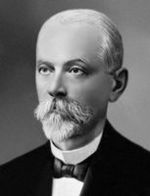

47% named Albert Einstein
23% could not name anyone
6% named Marie Curie
4% named Louis Pasteur
4% named Thomas Edison
The survey was conducted by L’Oreal, but the methods were not revealed. Therefore it is not possible to determine if the results can be extended to the adult population in general. Nevertheless, the poor showing on naming a famous scientist is an indictment of the science education of those who participated in the survey.
I’m interested in how the readers of virology blog would respond to the question, ‘Name a scientist’ – it doesn’t have to be a famous scientist, and it should not be a relative, or the author of virology blog. Don’t look up someone in a book or online – I’m interested in who you would think of spontaneously. Post your answer – just one scientist – in the comments section, or send it to virology@virology.ws. I’ll reveal the results here in a few weeks.
In attempting to determine how the L’Oreal survey was conducted, I learned about the L’Oreal-UNESCO For Women in Science Program, an effort to celebrate women who have dedicated their careers to scientific research, and to encourage emerging talent to pursue scientific discoveries. It’s a commendable program, and I do hope they impress upon the recipients of these awards the need to educate the public about their work.

Glenn Theodore Seaborg, winner of the 1951 Nobel Prize in Chemistry, former cancellor of UC Berkeley, and a damn decent guy.
Steven Hawking was the first name that came to mind, and I'm pretty sure I could come up with more than a hundred names without all that much trouble; I suspect most of your readers could dew the same. But the set of people interested enough in science to read a virology blog is perhaps a slightly different population than the one L'Oreal sampled.
Richard Feynman
Nikola Tesla
Neils Bohr
I thought of Curie quickly followed by VS Ramachandran and Freeman Dyson, for some reason.
Neil DeGrasse Tyson.
It is difficult to comment entirely spontaneously after reading a list of scientists. But assuming the question really is “name a scientist other than the four mentioned here”: I would of course say Charles Darwin! Not mentioned because his name might be synonymous with “agent of the devil” to many, perhaps. Or Fermi. Or Skinner. Or Watson. Or any of the fine fellows after whom units are named: Ohm, Watt, Joule, Newton.
Or Oppenheimer. Or perhaps my all-time favorite:s Feinman, B. Fuller, and Dyson.
Scheordinger
First thought was my late father, but I can think of plenty I'm not related to. Phil Plait of Bad Astronomy Blog. Greg Laden. Carl Zimmer. Alex Santoso. I get all my science from blogs these days.
Carl Sagan
…was the first name that popped into my head. How about scientists whose names are part of our language and culture? Fahrenheit, Hubble, Hertz, Newton, Diesel, Watt, Bell, Nobel, Darwin, Bill Nye
Newton
Michio Kaku
Newton
Nikola Tesla
Lev Termen
I know only few people those are unvaluable , namely
antony van leeuvenhoek
louis pasteur
robert koch
lodish baltimore
john gregor mendel
charles darwin
isaac newton
madamcurie
roengtoen
edward jenner
joseph lister
m s swaminathan
t h morghan
hugo de wries
watson and crick
alexander fleming
Richard Feynman
John Bardeen
Mr. Wizard!
True, though I believe Einstein's was the first to realize what maxwell's equations actually implied. Please correct me if I am wrong.
Thought of Albert Einstein first, but immediately thought of Nikola Tesla following.
Robert Oppenheimer
Richard Feynmann of course.
The first name that came to mind when I saw this was Clifford Stohl, an astronomy proffessor at Cal Berkeley who wrote a fabulous book called Cuckoo's Egg about early internet days (2400 baud modem period) when he detected an intruder to their network and he tracked the caller back to a spy in East Germany or something. Very witty story contrasting the hippy, tree-hugger, bicycle-riding professor and the men-in-black, sunglasses wearing FBI guys who show up to work with him in locating the intruder.
Second name that came to mind is my high school physics teacher, Bill Layton… this dude made his own 1000 watt speaker system and played old vinyl zeppelin records at lunch break.
Third is the late, great Randy Pausch from Carnegie Mellon.
Stefan Banach
Cauchy.
nikolai tesla
richard feynman
Kurt Gödel
Nikola Tesla
Jonas Salk, who invented the first polio vaccine. Then again, I'm a historian, so that could be considered cheating. 🙂
Nicolai Tesla. Total badass. Crazy as hell though.
Nikola Tesla – a pioneer in a brave new world who's passion and genius was unequaled.
Isaac Asimov had a Ph.D. in biochemistry and was a tenured associate professor in Boston University, school of Medicine. He was a real scientist. Many science fiction writers were scientists first. I don't know about Forsyth or Ludlum and I'm not disparaging them, but when the criterion is 'a scientist', Asimov certainly qualifies.
Mary-Claire King
richard feynman
Carl Linnaeus, Christopher Polhem, Anders Celsius
Eli Metchnikov – discovered phagocytosis in starfish larvae and is one of the fathers of immunology
Turing, Masters and Johnson, Dr Cornell West 🙂 ….
Oh come on, let's open it up to include the Otremere!
Ibn Sina-wrote a medical textbook that was used for 500 years
Al Battani-by combining Babylonian and Egyptian al jabr (that's algebra for those who la atatkallum alarabi) with Greek geometry, invented trigonometry.
(If the Arabic is off, I apologize-been a while)
Werner Heisenberg
nikola tessla
nikola tessla
Svante Arrhenius
CV Raman, one for the indians
Feynman
Philip Plait, The Bad Astronomer
Might have something to do with reading his blog though.
Bill Nye!
But in seriousness, Isaac Newton.
Nils Bohr is the first that springs to mind for me.
Nicola Tesla is my personal favorite. He would have made a great Bond villain.